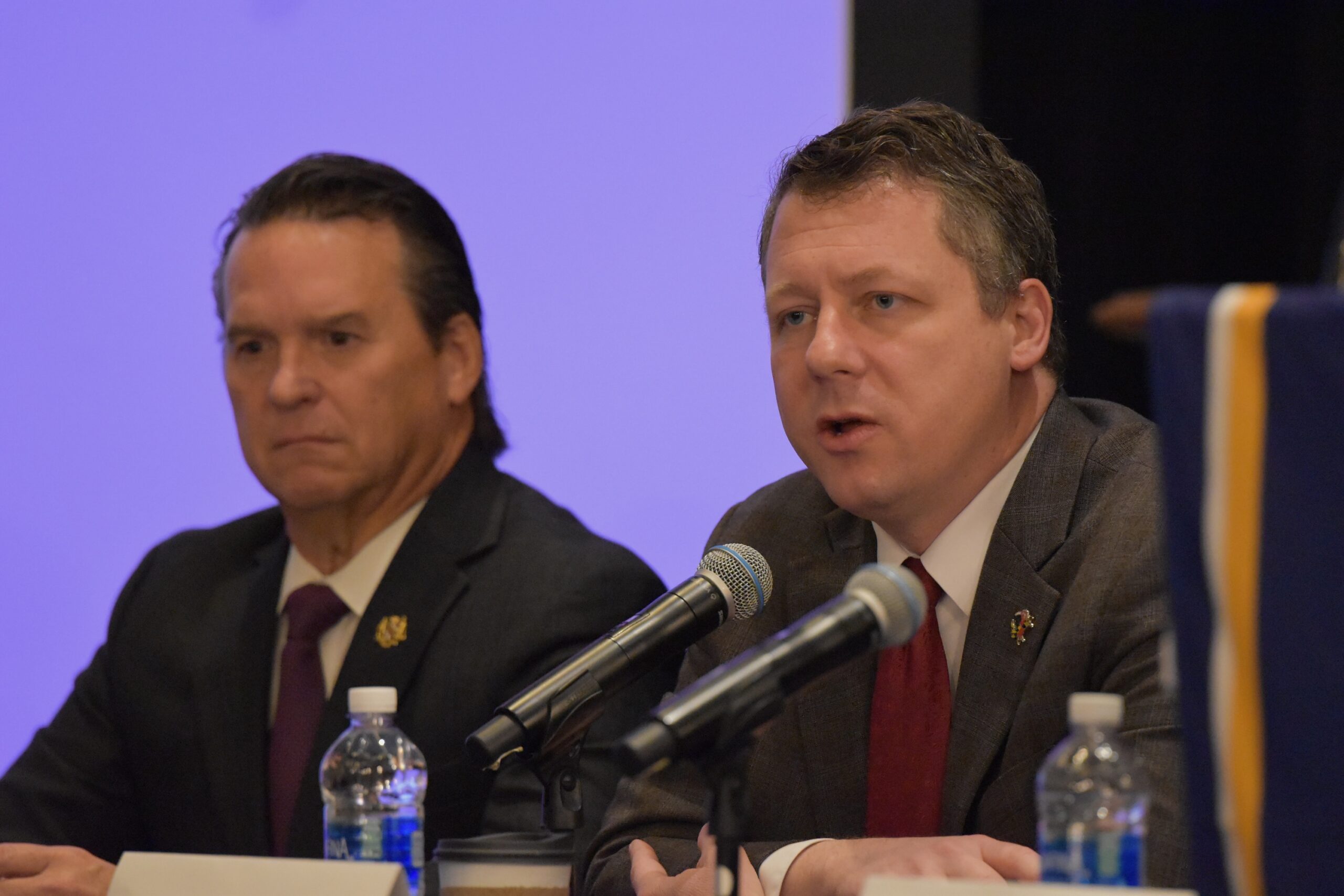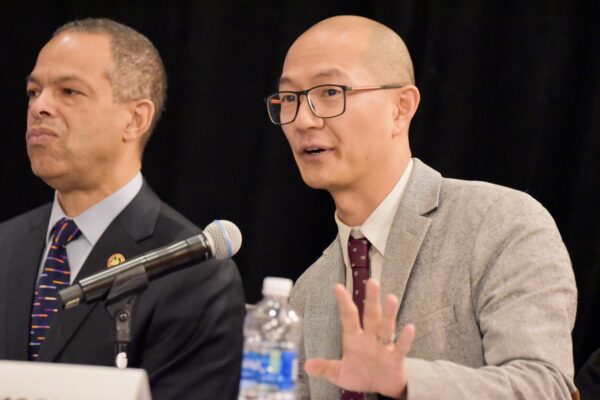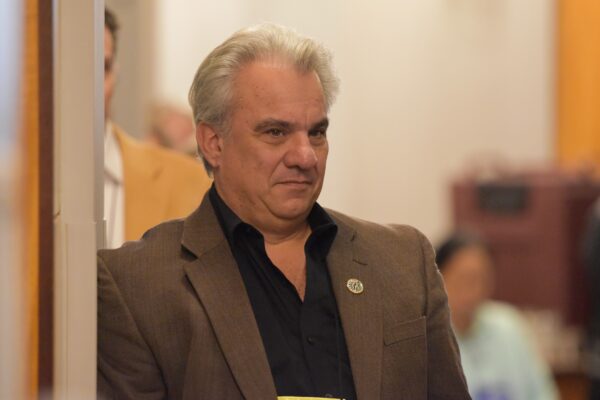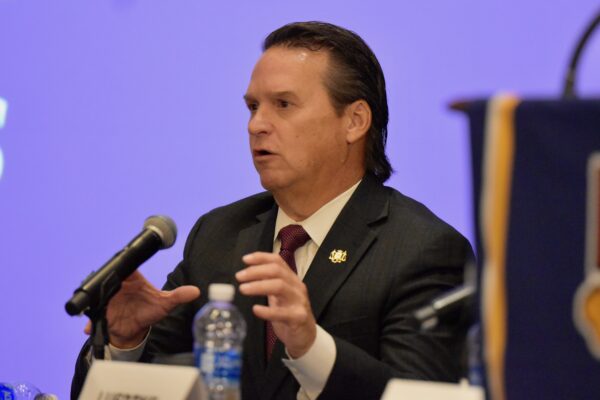Tough decisions, possible tax increases cloud coming legislative session

Taxes and cost shifts are on the table for the coming General Assembly session as Gov. Wes Moore (D) and lawmakers look to solve both a structural budget shortfall and massive cuts to transportation projects.
Eric Luedtke, Moore’s chief legislative officer, told county officials Friday that the coming legislative session will center around “answering some really tough questions” because of an end to billions in federal aid that pumped up state coffers in recent years.
“How do we continue to achieve what we all want to achieve in terms of education, in terms of transportation in terms of economic development in terms of public safety? How do we do that in the context of a fiscal situation that is tighter than it’s been for the last few years?” Luedtke said during the closing day of the Maryland Association of Counties winter convention in Cambridge.
Local government leaders left the Eastern Shore after a tough three days that focused on $3 billion in cuts to state transportation projects over six years, with few answers on how to pay for a plan to improve public school education that some counties say they cannot afford.
Also on the minds of county leaders is the potential for Moore and lawmakers to shift costs of programs currently paid for by the state to local governments or even more cuts in state aid.
“I don’t think you’re going to see anything of the scale of the Great Recession shifts,” said Luedtke. “…Our challenges in the Transportation Trust Fund, at least in this year, are much more significant than our budget challenges and I think it’s a little early to answer that question. The governor will be releasing his proposed budget in early January. But I can assure you that in all of the conversations we’re having internally in the administration, we take very seriously the impact of any decision we make on the governor’s proposed budget.”
Last month, legislative budget analysts told the joint Spending Affordability Committee that the state faces a structural gap of $322 million in the coming legislative session. Projections show the gap continuing to grow in fiscal 2026 and 2027 to $376 million and $436 million respectively.
By fiscal 2028, the gap would grow to nearly $1.8 billion followed by a nearly $2.1 billion deficit the following year.
The committee is expected to meet later this month to make non-binding recommendations on budget growth.
The news, however, has raised the specter of tax increases.

House Majority Leader David Moon, left, (D-Montgomery) said the General Assembly sill have to “pull up some grown up pants” and find ways to pay for transportation projects and other needs or face cuts. Photo by Bryan P. Sears.
“If you’ve looked at the history of the House, the House has generally been okay with trying to do some grown up things on this [taxes],” said House Majority Leader David Moon (D-Montgomery). “There’s an open question about whether we’re in a consensus time and are going to reach a consensus time on this.”
Moon said it may be time to “pull up some grown-up pants and do something” or resort to “living within our means” and accepting cuts.
“I think that’s pretty clear,” he said.
Some county officials bristled at Moon’s blunt observation.
“The question I have though, is why is the discussion frame that we have to put on our big white pants to deal with this?” said Worcester County Board of Commissioners President Anthony “Chip” Bertino Jr. “And the only way to do that is to spend more money.
“I don’t understand why the grownups get to spend the money and those of us are those who believe that maybe accounting for what we already have spent should be the way to go,” he said.

Worcester County Board of Commissioners President Anthony “Chip” Bertino Jr. Photo by Bryan P. Sears.
It’s not yet clear if the House and Senate have a consensus on tax issues.
“We’re going to need to take a look at … the governor’s budget … to see where there might be gaps and where we think our priorities are,” said Senate President Pro Tem Malcolm Augustine (D-Prince George’s). “I think it’s really premature actually to start to talk about [taxes] at this time, because we really don’t yet know. I don’t think that we’re actually in a place today to be able to do that.”
Leaders of several counties and the city of Baltimore are also urging the General Assembly to ease the stress on their budgets by mandates to cover the local costs of the Blueprint for Maryland’s Future education reform plan.
“I represent two counties on the Eastern Shore that have said from the onset that this was unaffordable,” said Senate Minority Leader Sen. Stephen S. Hershey Jr. (R-Upper Shore). “Unfortunately, that falls on deaf ears until Prince George’s County and Baltimore City say well, we can’t afford it either. Now that becomes a discussion.”
But Democrats, who hold the governor’s office and are a supermajority in both the House and Senate said a change is unlikely.
“I just don’t think it’s in the cards to see Maryland start walking back its commitments to invest in public education,” said Moon. “So let me start there. I would be very surprised to see us heading towards that outcome.”
Counties now face the additional pressure of $3.3 billion in cuts to highway and transit projects and local shares of highway user revenues over the next six years. The cuts hit favored projects in every jurisdiction in the state.
The Transportation Revenue and Infrastructure Needs Commission is expected to recommend the creation of new fees on owners of electric vehicles and toll increases on out-of-state drivers. Neither will be enough to close the gap created by declining fuel and new car taxes and increased costs of projects.

Senate Minority Leader Stephen S. Hershey Jr. (R-Upper Shore) said many counties including two he represents, cannot afford to pay for their share of the Blueprint for Maryland’s Future education plan. Photo by Bryan Sears.
Moore, speaking to the association Thursday night, said the cuts were tough medicine and part of a “season of discipline.”
“I think we’re all very concerned by the transportation cuts that have been proposed,” Moon said. “I was surprised by the breadth and the depth of them and how they touch nearly every corner of the state.”
Both Moon and Augustine said they expect the legislature to attempt to address the issue. Augustine held out hope that massive cuts could be avoided.
House Minority Leader Del. Jason Buckel (R-Allegany) warned against imposing tax increases in a difficult economy.
“You can’t get a billion dollars or $2 billion out of the millionaire’s tax,” said Buckel. “You can’t get a billion or $2 billion out of the gambling industry. It does not exist. The only way you can get it are broad-based, across-the-board, affecting-almost-everyone tax hikes. I don’t think people want to do that.”
Lawmakers on the panel offered a glimpse of their own legislative agendas for the coming 90-day session though no specifics were announced.
Topping that list is a focus on juvenile crime. Some state’s attorneys and law enforcement agencies say recent changes in state law makes it more difficult to prosecute and punish young people accused of committing crimes.
“There is some middling news for some of the youth crime that is out there as far as it being somewhat down but it’s still just unacceptably high,” said Augustine. “We know that we’re going to have to do something about that.”
It is not clear how close the House and Senate are on the issue with four weeks before lawmakers return to Annapolis.
“We are taking this issue very seriously. But you know the solutions you’re going to get are not going to be real stuff if you’re not looking at the right thing,” said Moon. “There’s been a lot of talk about this issue. DC right now has juvenile carjackings going through the roof. I assure you this is not happening because of changes in Maryland law that went into effect this October. So again, everyone take a deep breath.”
Moon added that Democrats will also revisit some firearms legislation that failed to pass last year.
“I’ll start with the firearm crimes and just say we have unfinished business as all these court decisions unwind and create a new reality and a new volume of firearm possession in the state — legal and illegal. This is something we have to deal with,” said Moon.
Last month, House and Senate Republicans announced a five-bill package focused on criminal justice issues.
Moore on Thursday announced that he will have a 12-bill package focusing on a wide range of issues. The governor is expected to provide more details on those bills in the coming weeks.




 Creative Commons Attribution
Creative Commons Attribution